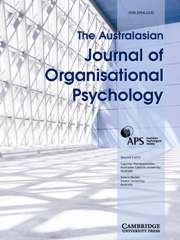Article contents
Distinguishing Between the Effect of Perceived Organisational Support and Person–Organisation Fit on Work Outcomes
Published online by Cambridge University Press: 23 February 2012
Abstract
While previous research has contributed to our understanding of the effect of person-organisation fit on a range of job outcomes (e.g., Chatman, 1989; Kristof-Brown & Jansen, 2007; Schneider, 1987), the relationship between person–organisation fit, perceived organisational support and job outcomes, such as job satisfaction and organisation commitment has not been fully explored. Further research examining the relationship between these variables is needed, particularly in organisational settings that experience high turnover such as hospitals. This study examined the relationship between person–organisation fit, perceived organisational support, job satisfaction and organisational commitment among employees in an Australian hospital setting. Person–organisation fit was assessed in terms of the fit, or congruence, between perceived organisational values and ideal organisational values. The study also examined the extent to which perceived organisational support moderated the relationship between person–organisation fit and job satisfaction and organisational commitment. Results showed that person–organisation fit and perceived organisational support were significant predictors of job satisfaction and organisational commitment. However, perceived organisational support was not a moderator in the relationship between person–organisation fit and job satisfaction and organisational commitment. Results also showed that perceived organisational support may be a stronger predictor of job satisfaction and organisational commitment than person–organisation fit, highlighting the importance of providing nursing and support staff with adequate support to carry out their work in hospital settings. The implications of the study are discussed and future research opportunities are highlighted.
- Type
- Articles
- Information
- Copyright
- Copyright © Cambridge University Press 2009
- 6
- Cited by


